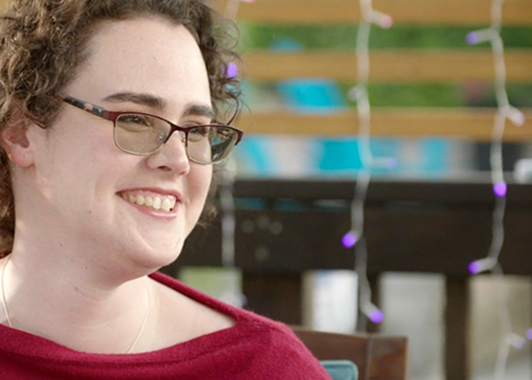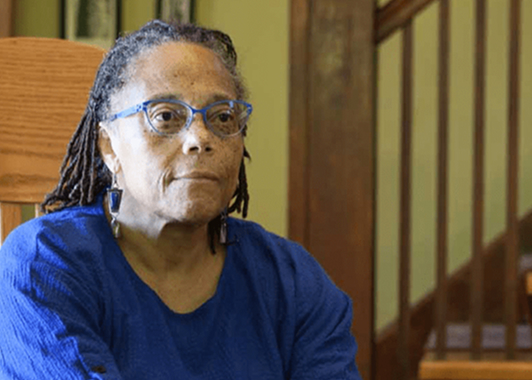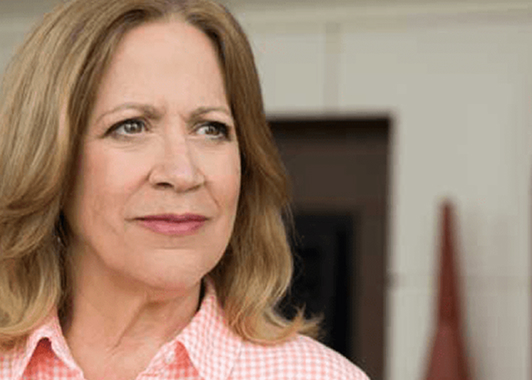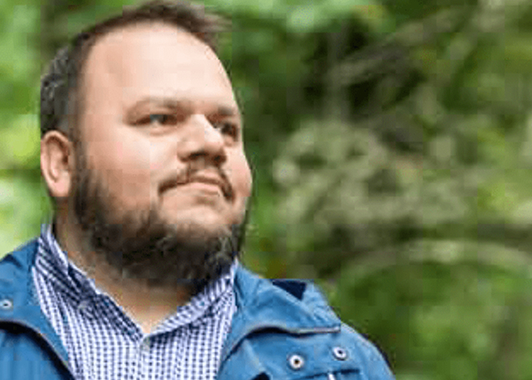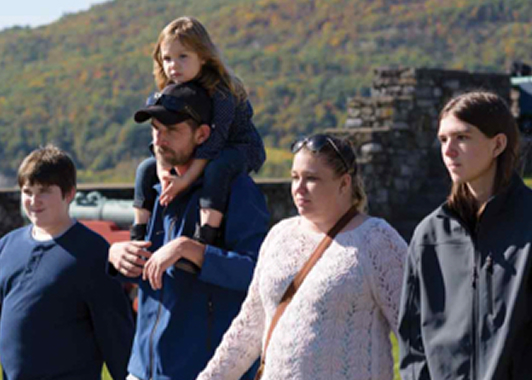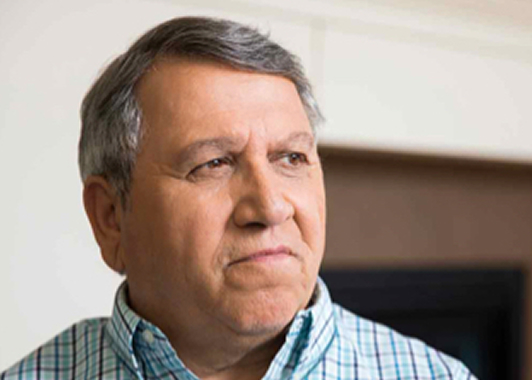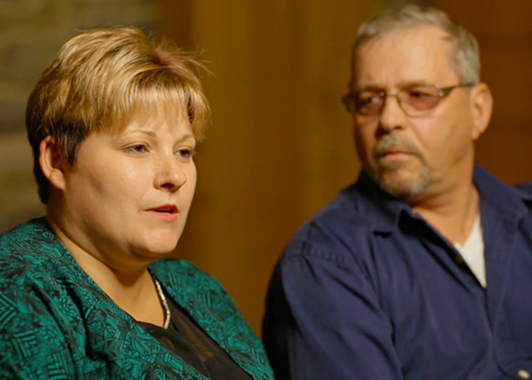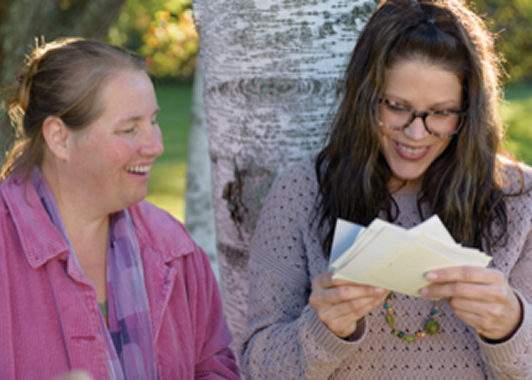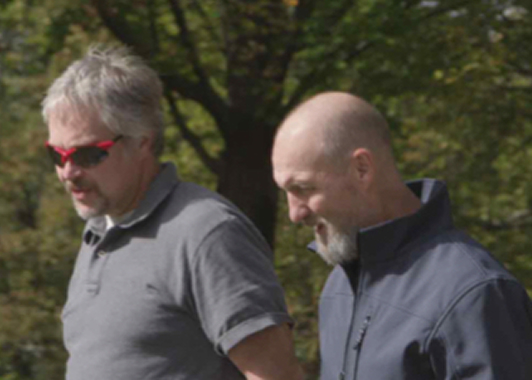Video library
Hear from people about their experiences living with hATTR.
hATTR Information
Hannah's journey: Turning an hATTR diagnosis into hope
For generations, Hannah's family faced the symptoms of hATTR without answers. Now, with an early diagnosis, she's redefining what's possible.
Hannah: Well, it all began when my aunt stumbled upon a letter that my grandmother's doctor wrote describing her symptoms. The symptoms of nausea, neuropathy, and body fatigue. We believed that it was a brain tumor and old age that took her. Through my experience, we realized that this may not have been the case.
Growing up, I enjoyed swimming. And I played on the traveling basketball team. In seventh grade I began having a severe headache, and I got very disoriented. I was taken to the closest emergency room, and I was consulted with a neurologist. I was tested for numerous neurological conditions. They could not find anything. We felt that there was something going on, but that nobody could figure me out. As I got older, my symptoms got worse.
I no longer had the strength to do activities I once did. I woke up many nights in severe body pain. It was challenging to walk. I missed a lot of events growing up. And I had to put my education on hold. I could no longer keep up. It was not just me. My mother and my uncle were experiencing the same symptoms. My uncle was the family favorite.
When his health started to deteriorate, they scheduled an appointment and was able to get answers and my uncle received his genetic test that confirmed he had hATTR amyloidosis. The doctor informed him it was hereditary and advised that all family members be tested for this gene. From that day on, I began the process with my doctor. I finally received my diagnosis at 29. Through genetic testing I found out that I had the T60A variant in the TTR gene. When I received the diagnosis, I wanted to hug my doctor and tell her thank you. My family and I had answers.
My doctor presented a treatment option, and she informed us that I walked into her doors at a perfect time because before that there wasn't any options available—options that some of my loved ones missed out on. Since working with my doctor, we have created a wonderful team. I don't have 100 percent energy back. I still have fatigue. I still have weakness. I still have neuropathy, but my symptoms are better than what they were. Early diagnosis is very important. I feel the earlier you can catch something the better off your body and health can be. My hopes for the future are that I will be able to finish my education and travel to Europe. It is amazing to see the growth of hATTR amyloidosis education just in the last 10 years. It makes me feel elated, it makes me wish that I could go and report this to my loved ones who missed out.
CeCe's story: Finding answers
After years of misdiagnosis, CeCe uncovered the cause of her symptoms—hATTR. Her persistence led to answers and a path forward.
CeCe: My life before hATTR amyloidosis was really full. I was working as a nurse practitioner. I felt like I was really making a difference. My husband and my children were doing amazingly well. And I felt like I was becoming the person that I always wanted to be. My initial symptoms was severe carpal tunnel syndrome. I would wake up in the middle of the night with my hands and arms burning with extreme pain. When the initial symptoms hit, we were really afraid. I realized that my symptoms of hereditary amyloidosis had become too much to handle. I was experiencing severe shortness of breath, I couldn't walk half a block, my ankles were swelling.
I went to see my primary care doctor about the carpal tunnel syndrome I was experiencing. From there, I saw multiple specialists. Between 2005 and 2011 I saw a neurologist, a pulmonologist, a cardiologist, a gastroenterologist, and finally, a rheumatologist. I received multiple misdiagnoses. We immediately realized, my family and I, that having a diagnosis meant that we could develop a plan and work together as a team to help me get well. Medical knowledge as a nurse practitioner kept me going forward. When I was diagnosed, I left graduate school, I resigned from my job, and even though I had to give up things that I loved, I knew it was necessary in order for me to get well.
I'm doing well managing my amyloidosis and my daily activities. I had a heart transplant. I am in regular contact with professionals at the Amyloid Clinic, and there are providers there who are familiar with hATTR amyloidosis. I hope that others learn that there are lots of red flag symptoms with hereditary amyloidosis. It's easy to get a misdiagnosis. Make sure you tell your doctor about all of the symptoms that you're having. I also want you to be brave, be tenacious. And, by all means, never, never give up.
The importance of genetic testing
After Ron Sr.'s hATTR diagnosis, his family took proactive steps to get tested and seek a diagnosis, helping future generations.
Ron Sr: When I first discovered that I had the gene, nothing was going on in my body. I was physically fit. I was running five, six, seven miles a day trying to stay fit and lifting weights and stuff. Then I eventually found out that I had problems climbing up stairs. I'd climb up halfway up the stairs, walk up them, and I'd get tired and have to stop. Even when I was tested, and found out I have it, that's when it really started worrying me about my family. Not so much me. I can deal with it myself. It's my kids. What's going to happen to them?
Sandie: Their reaction? Disbelief. They didn't want to hear it. First thoughts were, "What about me?", of course.
Don: Of course, I wanted to test for my own kids. Since I have five children, I wanted to know because if I did not have it, then they have 0% chance of having it. So, for me, it was important to know just for the simple fact that I needed to know what the plan was going to be for the children.
Ron Jr: Just knowing it is a big benefit because if you have no idea, and the disease catches up to you, you're going to be lost in the dark.
Ana: Unfortunately, it does cause a lot of anxiety, a lot of fear. To pick up whether someone is disease active or not, it causes a lot of anxiety of, oh, is this, you know, is it amyloidosis or is it something else? And so, you can never get a clear-cut answer on a lot of things. So, definitely it causes a lot of anxiety in my family.
Ron Jr: Testing early and know you have the disease, when it becomes active, you can attack it a little bit better, have a little bit more knowledge, a little bit more confidence that, you know, I know what this is, and now I know who to go to.
Ron Sr: As soon as you find out, when you're tested, you have it, and then you're tested again to see if it's active in your body, that's when you need to start seeking medical help.
Sandie: I want my kids to get tested within the next couple of years. I want my kids to experience as much of a regular, full life as they can.
Diagnosis Process
Inheritance of hATTR amyloidosis
Seeing previous generations struggle with hATTR, Ron Sr's family faces the disease, while finding strength in knowledge, support, and hope.
Ron Jr: For some reason I don't think I'll make it past my 50s. When I stop and start thinking about the mortality of it and everything, the things that come to mind is my wife and my daughter. And that's pretty much what I think about is what are they going to do?
Don: I try not to think about it as much. I just don't, you know, I just don't feel like worrying that there's not much I can do about it until, you know, the doctors do what they need or pharmaceuticals, you know, advance and, and things like that. You know, it's a little worrisome but, really, when my wife hears this stuff, she's, you know, she sees what her husband's going to have to go through, her children are going to have to go through. And just that, that part's hard.
Ron Sr: My father had amyloidosis. Nobody really knew what it was back then. As we grew up, we didn't even know about it, so we didn't even think about it until he was diagnosed with it. And it was said to us that it could be passed on. We had a 50-50 chance of having it be passed on to each individual.
Sandie: Amyloid is a disease in our family mostly of our nerves. My dad died in 1983. We knew it was hereditary at that time. Watching your parents suffer with this kind of disease, that as it advances all you want to do is lay around and sleep, isn't easy as a child. Watching my dad go through it was really rough.
Ana: It affects the body with the nervous system. It affects your GI tract. It affects your autonomic nervous systems. It overall just kind of takes your life away once it starts its process.
Sandie: We're a very close family. We share everything. There's a new symptom, we all want to know about it. It's important because this disease can creep up on you and you not even know it.
Ron Sr: I watched my dad and my uncles die from this disease. There was no hope for them at all. And then I believe it was my cousin and my sister that got tested for it and actually found out they had it. And they wanted me to get tested so I got tested. I believe it was back in 2004. And then once you have it you say, "Oh well, what's going to happen?"
Ana: A lot of people, unfortunately, do shrug it off. But it's not something to shrug off. If you know your family has a history of this and you start having the symptoms, shrugging it off is definitely not the right decision.
Know your family history
hATTR has affected families for generations, often as an unexplained illness. As symptoms appear, knowing family history is key to awareness.
Angel: My family has been diagnosed with a disease since the 1980s. My grandpa and his generation, his brothers, they saw their grandfather pass away from what they called the curse.
Dane: When I was little, seeing my grandfather, sitting there at the table and I didn't realize what his sickness was. I just see what he went through.
Mark: Me losing my father was a tragedy that uh, I still haven't recuperated from.
Angel: It's called hereditary ATTR amyloidosis. It was first diagnosed in my grandpa and my great uncles. They had passed away from it in the late 80s, early 90s. Now, my mother's generation and the older generation of my people are now showing symptoms.
Tonya: Amyloid has kind of been the black cloud in my family, I guess it's the only way I can really describe it.
Daryel: It's a terminal disease. It affects your life. Affects your outlook on life.
Tonya: My mother moved in with me, I really didn't know how bad she was, until she actually moved in with me. She sleeps constantly. She has a hard time walking sometimes, because the pain between her knee and her hip is so severe.
Angel: These are real people and these are real faces and and you know, these, we need research. We need management. We need people paying attention to us and knowing that this disease applies to real people.
Journey to diagnosis
Diagnosing hATTR isn't always simple, but understanding the disease helps patients work closely with their doctor to get an accurate diagnosis.
Ana: Hereditary ATTR amyloidosis, it's kind of a devastating disease. It's hard to watch your family suffer through it and not be able to do anything.
Don: With the symptoms, I do have some neuropathy in my hands. Like, if I go on a bike ride, two miles into it, my hands are numb. Simple things around the house, like you know if we wanted to repaint a room, you know, you'll get about a quarter of the room through and you just, I just have to stop and just kind of look at your hands like, you know, work, work with me here.
Sandie: One of the things that really bothered me was my feet. And my hands. I didn't have feeling. Every doctor I've gone to, had to look it up. I haven't had a doctor those past 13, 14, 15 years that knew it when I walked in. And that's disheartening.
Ron Sr: So, we see what this disease does. It's a terrible disease and you live with it. You got to keep going on or you have no choice.
Sandie: My hope is to get the word out there, I think. Make people realize that there's something out there.
Ana: We suggest educating your doctors about the disease as much as possible.
Ron Sr: By us learning about this disease, as much as we can, and educating our doctors, it's helping them, bringing them back into the field where they think this is very interesting and they're learning more about it. And the more we can help them, the more they can help these new patients coming in with this disease.
Family Matters
Become a family advocate
Angel is turning pain into a mission for change by raising awareness of hATTR. She's ensuring her family and others get the support they need.
Angel: I know that watching my uncle, my grandfather, and my mother go through this disease has been painful because I want to help. I want to take it away. I want to take the pain away. And I'm not able to. And I decided that somebody needs to take up the charge. Somebody needs to put a face to this disease. And somebody needs to make sure that it is getting the attention and the research that is needed.
Tonya: My sister, Angel, she was tested I believe two years ago, and the results were negative. But she could've just stopped there. She's just networking everywhere to get people aware, to get our family help.
Deedra: She's been like a driving force for this whole family because it's so hard to get all of us together.
Daryel: My daughter, Angel, is amazing. She doesn't want to see any of her brothers or sisters or their kids have to live with this. I cannot ever thank her enough. This family can't thank her enough. We owe a lot to her. We do. And I love her.
Explore genetic testing
Families facing hATTR share their stories of genetic testing, balancing fear with the need for answers, as research advancements can bring hope.
Angel: I was, it was probably, 10 years old, 9 years old when everybody started getting tested. We discussed the disease, we discussed the potential of me having the disease, we discussed what would happen if I got sick. We discussed what would happen if that gene was passed on to our children. And it was pretty scary.
Dane: I started going and getting tested because I started seeing myself happening, what I see my grandfather was going through. Well now I'm more worried because of my children, now that I have it. Not knowing if my children have been tested or if they have it or not, or if they've been told, or ...
Mark: My father died of the disease. In the 80's. I didn't test with the rest of the family. I figured, what's the need to know? I had learned through several of my relatives, studies have been ongoing, and that there is in fact some hope out there for those who have this. So, I went ahead and tested.
Tonya: I got tested a year ago. Because I wanted to know, I don't think so much for myself. I think because I have three girls that need to know.
Seek family support
Despite the difficulties, those living with hATTR emphasize perseverance and encourage others to not give up.
Dane: It seems to be harder to tie my shoe. To do a lot of things and to hang on to things. My hands are constantly going numb, cold. Just feel upset stomach all the time and exhausted. I'm really exhausted. Going back to different family members that haven't been involved, they're telling me the same stuff that I had learned when I was younger, and they're asking me the same questions that I had asked. So, getting people educated, on this more, is helping, I think.
Daryel: There has been times when I have looked at people that don't have this disease and I say "Why me?" But then in the same moments, I look and I had three fantastic role models. My father, my uncle, they never gave up. Nobody should give up. You should hold your head and keep going. Be proud. Stand up and do it.
UP NEXT
Connect with an educator

